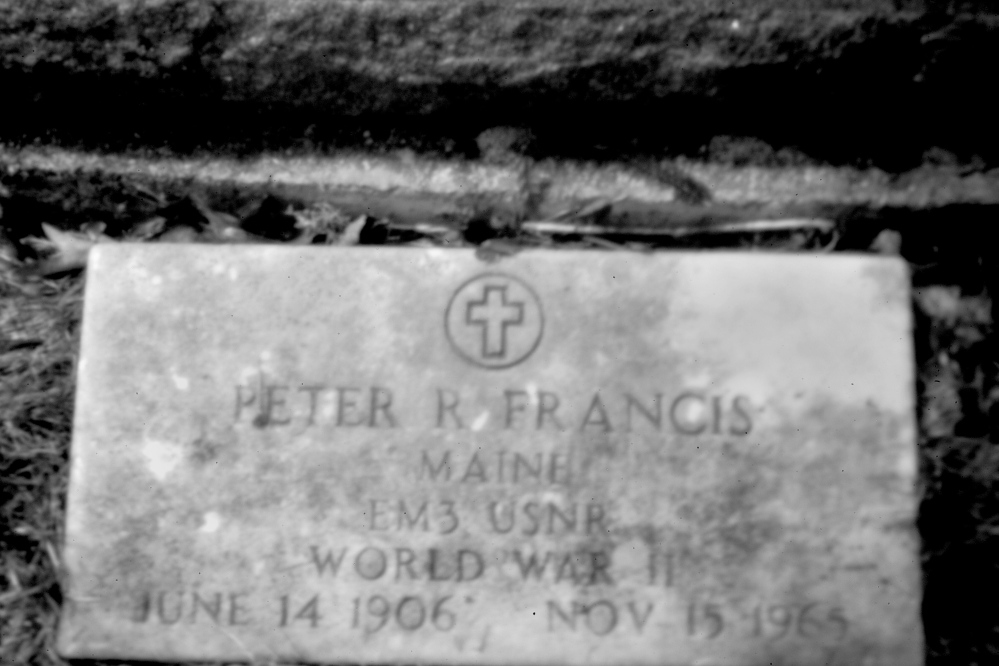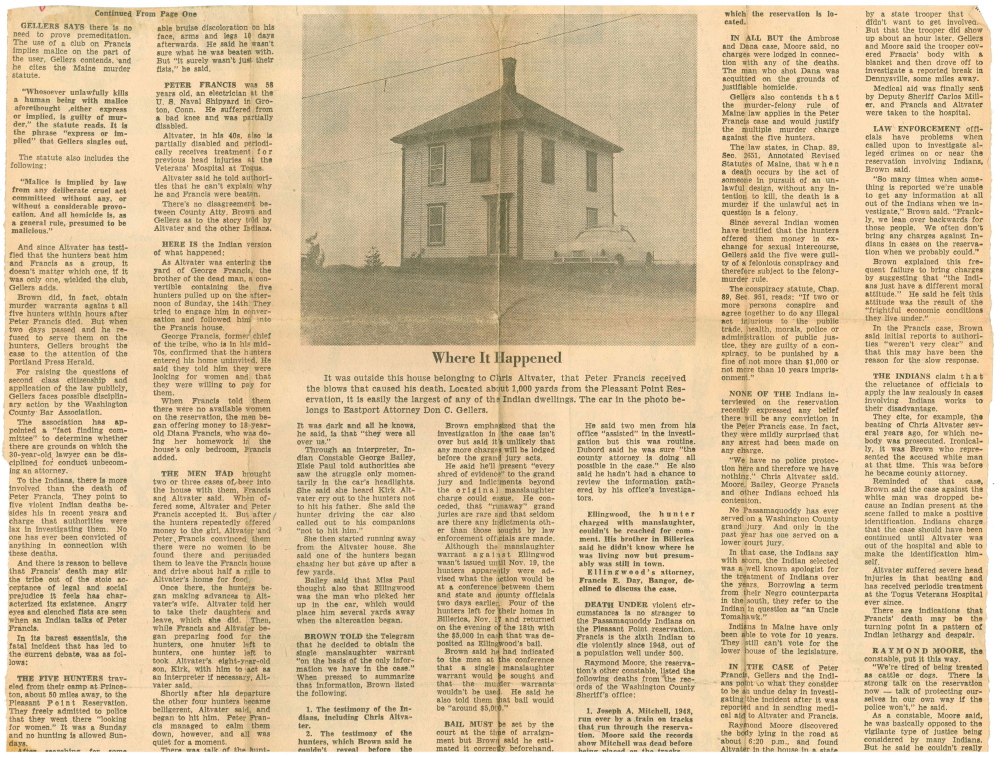
I
t was dinner time, and Press Herald reporter William Williamson was home in Kennebunk and about to cut into a steak when the telephone rang. He answered, disgruntled.
It was a source, Don Gellers, a young attorney in Eastport who had recently been championing the cause of the Passamaquoddy Indians on the other side of the state. Gellers was breathless and excited. Williamson coldly told him he’d call back after he finished his dinner.
When he did, he found himself listening for a solid hour while Gellers told him the harrowing story of Peter Francis being beaten to death by five white hunters 48 hours earlier. He related how the Eastport police had refused to respond to Christy Altvater’s calls for help because he lived 1,000 yards from Eastport, and how a town policeman had told him he “didn’t want to get involved,” and how a deputy sheriff had ignored him altogether.
Gellers related how Altvater had next called him for help, his voice unrecognizable on account of the swelling of his face and jaw, and how the tribal constable had pleaded with hospital staff in Eastport to dispatch an ambulance to treat Francis, who lay dying in the road for more than an hour before help arrived. The 59-year-old man expired at the Eastport hospital the following morning.
After interviewing the hunters, Gellers continued, County Attorney Francis Brown – the equivalent of a district attorney today – drew up five murder warrants. They were never served. An indignant Gellers told Brown he would go to the press if they were not issued by 6 o’clock that evening. They weren’t, which is why Williamson found himself on the phone. Gellers accused Brown of a “deliberate flouting of the law” that would not have occurred if the victims were white.
Gellers had called Williamson because he had heard he was a fearless and crusading reporter, one unafraid of challenging authorities. Indeed, Williamson would later become a social worker; his family recalls him daring a shotgun-bearing man to shoot him as he strode into a house to retrieve an endangered child.
He wouldn’t disappoint. His story ran the next day, with Brown confirming the warrants had not been served “because we don’t feel we have enough information.” A few days later, Williamson was at Pleasant Point, exploring what he would later call the “many seemingly incredible questions about what was going on up in Washington County.”
B
y the time Williamson arrived, the hunters were back at their homes in Billerica, Massachusetts. Inexplicably, none had been charged in Christy’s beating. One, James Ellinwood, faced a single manslaughter charge in Peter’s death and had been freed on bail.
Gellers, on the other hand, was being threatened with disbarment for publicly questioning the authorities. The Washington County Bar Association had formed a “fact-finding committee” to determine whether Gellers’ comments to the Press Herald constituted “conduct unbecoming of an attorney.” According to an account that Gellers later wrote, his fellow lawyers said they would call off the investigation if Gellers would claim in writing that he had been misquoted in the press. He responded that he would do no such thing, and that he’d “continue to do all I could to protect Indian lives and property because, as long as those two things weren’t safe, the value of everyone else’s life and property was thereby cheapened.” (The bar association ultimately backed down.)
Indians told Williamson they were furious that no charges had been brought against four of the hunters and that nobody was being charged with murder. They noted that six Pleasant Point Passamaquoddy had been killed over the previous 17 years – in a community of 330 – with nobody being held accountable. “Is the Indian testimony being considered seriously and is the law being applied fully in the case?” Williamson’s article would ask on their behalf. “Are (they) second-class citizens, legally as well as socially?”
Brown told the reporter he didn’t serve the murder warrants because he felt he couldn’t prove premeditation. Gellers pointed out he didn’t need to. Law enforcement had concluded Peter died from a blow with the nail-studded two-by-four, the use of which constituted the “malice aforethought” under the state’s murder statute. Further, Gellers said, because the Indians were beaten by a group, it didn’t matter which ones had wielded the club. And because the hunters had offered girls money for sex, Gellers argued, they were involved in a felonious conspiracy even before the deadly attack.
Pressed by Williamson, Brown also admitted that he’d given the hunters a heads-up – two days ahead of their court arraignment – as to what charges they would and wouldn’t face and the amount of the bail Ellinwood would need to raise. This allowed the other four to drive to Billerica and collect the money, ensuring their companion would be sprung from jail immediately.
A murder charge, Brown said, would “merely be wasting the taxpayers’ money.”

Indians were incensed, though no one Williamson interviewed “expressed any belief there will be any conviction in the Peter Francis case,” he would write in a bombshell front-page story in the Sunday Telegram on Dec. 5, 1965. “In fact, they were mildly surprised that any arrest had been made on any charge.”
But the killing, Williamson would write prophetically, looked to be “the turning point in a pattern of Indian lethargy and despair.”
“We’re tired of being treated like cattle or dogs,” tribal constable Raymond Moore told Williamson, noting that some were considering taking law enforcement into their own hands. “There have just been too many deaths and nothing is ever done about them.”
In that pre-Internet era, Gellers and George Francis worked hard to turn a national spotlight on the case and keep it there. They wrote U.S. Sen. Sam Ervin, a North Carolina Democrat, seeking the intervention of the Senate Subcommittee on Constitutional Rights, which he chaired. (Ervin demanded an accounting of the situation from Maine’s attorney general but ultimately determined his committee lacked jurisdiction because the slaying took place just off the reservation and Francis was not engaged in civil rights activities when it took place.)
Alerted by Gellers, the National Council of Churches – which represented the then-influential mainline Protestant denominations – asked U.S. Sens. Edmund S. Muskie and Margaret Chase Smith of Maine, and the Justice Department to investigate. “We are concerned by reports that four of the five white hunters are not being prosecuted,” the Rev. J. Oscar Lee, a council official, told the United Press International news service in New York. “The denial of justice in Maine is as serious as the denial of justice in Alabama or Mississippi.”
A delegation from the Maine Council of Churches met with Brown in January and declared they were unsatisfied with the county attorney’s explanation for why the murder warrants had not been issued. Soon they were in Attorney General Richard J. Dubord’s office, demanding action. Thereafter, Dubord started telling reporters there would likely be “secret indictments” brought in the case.
All of this was front-page news across Maine, and the handling of the case even made “The CBS Evening News” with Walter Cronkite, arguably the most influential figure in the news world at the time.
It had no effect. In February, an all-white grand jury in Washington County returned Brown’s single manslaughter indictment, one worded so strangely it raised the eyebrows of attorneys across the state. Garth Sprague, an attorney in Machias, the county seat, told Williamson the wording created “a made-to-order case for any defense attorney,” as it contained language for the lesser charge of assault.
No secret indictments ever emerged.
Ellinwood plead not guilty. The other four hunters were already home free.
Colin Woodard can be contacted at 791-6317 or at:
cwoodard@pressherald.com
Coming tomorrow:
Tribe endures a farcical trial
Send questions/comments to the editors.




Success. Please wait for the page to reload. If the page does not reload within 5 seconds, please refresh the page.
Enter your email and password to access comments.
Hi, to comment on stories you must . This profile is in addition to your subscription and website login.
Already have a commenting profile? .
Invalid username/password.
Please check your email to confirm and complete your registration.
Only subscribers are eligible to post comments. Please subscribe or login first for digital access. Here’s why.
Use the form below to reset your password. When you've submitted your account email, we will send an email with a reset code.